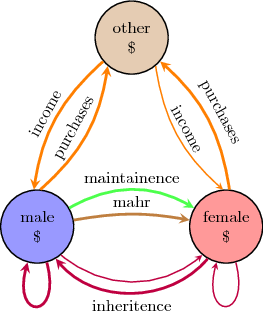In addition to the other answers which point that the man is responsible for his wife, children, elderly father, mother, etc and that women have no such responsibility and are also entitled to nafaqa and mahr:
I can give you a more complex explanation from my personal observation, nothing official. I fear for the pro-feminists would not like it. I see myself as one who respects women a lot a lot—just in a very different way. You can see my other answer on obedience of a wife
To find your answer: Look into the west and compare it with (true) Islam, not ignorant Islam. To see what I mean, again see my the answer I linked above.
In the west ( In US the rate of divorce is %40-50 significantly higher than average Muslim countries, although the western culture is affecting them) women have equal share of money and are far less inclined to marry themselves to another. They're like I'm financially stable why do I have to marry him, or why do I have to still be married to him while I can sustain myself?! Islam's idea isn't to weaken women, rather it's to make both sides more desirable and performant in what their role is.
Then when women become more economically powerful then the husband on the other side will also need to be more economically powerful. Her quality of life is raised and the number of her possible matching husbands decrease. Women will just have more casual dates rather than serious commitments.
What becomes virtuous among women becomes their money, their car, their house, their education, their degree (some require a lot of time and eventually increase the average age of marriage and reduce the average number of children). All mundane stuff. Islam wants us to shatter than way of thinking. Islam totally agrees with a mother/wife's education but wealth for a wife is not virtuous, for a husband it is somewhat.
The logic seems very stupid and harsh.
But basically it's that most of the money is to come to the husband so he is deemed more appealing to a future bride and then let him give to his wife so love is kindled among them.
In addition go to a shopping center and then see what percentage are women and what percentage are men. Men are more likely to hold onto their money.
Despite near equality in numbers, according to Bloomberg, women make
more than 85% of the consumer purchases in the United States, and
reputedly influence over 95% of total goods and services purchased.
On a semi-serious note I sometimes ask myself how did my wife agree to marry herself to me? I mean wasn't wealthy in any way, didn't have a house, car good investment. All I had was a job and fresh out of college. Perhaps with such support I and other husbands will be more appealing to women. Men never assess a lady based on her wealth. Even though she can she bring it (her money) to her new life, it isn't part of her duties.
Having that said there are points that I obviously don't understand on this and many other subjects.
Also see the comments below.

